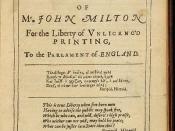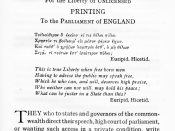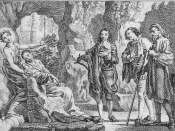Living in a period of religious and cultural fluctuation, John Milton's poetry reflects the many influences he found both in history and in the contemporary world. The pastoral elegy, Lycidas, written after the death of a friend, Edward King, exemplifies Milton's ability to fuse classical references with the occurrences of the 17th century. Milton portrays this ability in the four psychological phases the narrator experiences after the death of his friend, Lycidas. The first stage, is one of grieving over the death of his dear friend. After this first stage of mourning, the narrator seeks to blame someone for Lycidas' death even after exonerating himself. However, since there is no one to blame, this causes the narrator to undergo the phase of mourning for a second time. The narrator re-emerges from this stage with the realization that there is no need to mourn the death of Lycidas. Through these four psychological phases, Milton effectively combines the classical references with the 17th century.
Upon reading the first part of this poem the reader realizes that the narrator is mourning the death of Lycidas, just as the Milton, in writing this poem, was mourning the death of King. In the lines that read, "Who would not sing for Lycidas...He must not flote upon his watry bear unwept, and welter to the parching wind, without the meed of som melodious tear," the reader understands that the speaker wants to pay tribute, through song, to Lycidas, who he believes was a victim of the ocean's wrath (9-13). In accordance with pastoral tradition, the narrator summons the Muses for inspiration, when he says, "Begin then, Sisters of the sacred well, that from beneath the seat of Jove doth spring...so may som gentle Muse with lucky words favour my destin'd Urn" (14-19). Through the narrator's summoning...



Alright
This is alright, but its a really difficult poem anyway, and I think you could have explained the classical references better as I have read the poem and still didn't really understand. What are the Muses?
1 out of 3 people found this comment useful.